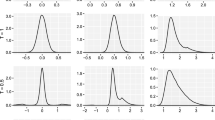Abstract
Several response-adaptive designs are available to allocate sequentially entering patients between two competing treatments, so that a larger number of patients are treated by the better treatment. Most of the designs are for binary treatment responses. Among the few available designs for continuous responses, the continuous drop-the-loser (CDL) rule of Ivanovo et al. (2006) has lower variability of the proportion of allocation to any treatment. The present article provides some modifications to the existing CDL design and extends the CDL rule to provide two new designs that have more or less the same allocation to the better treatment as the CDL, but the variability is shown to be nearly 40% less than that of CDL. The applicability of the proposed designs is illustrated by redesigning some real clinical trials.
Similar content being viewed by others
References
Bhattacharya R. Urn-based response adaptive procedures and optimality. Drug Inf J. 2008; 42:441–448.
Zhang L, Biswas A. Optimal failure-success response-adaptive designs for binary responses. Drug Inf J. 2007;41:709–718.
Ivanova A, Rosenberger WF. Adaptive designs for clinical trials with highly successful treatments. Drug Inf J. 2001;35:1087–1093.
Bartlett RH, Roloff DW, Cornell RG, Andrews AF, Dillon PW, Zwischenberger JB. Extracorporeal circulation in neonatal respiratory failure: a prospective randomized trial. Pediatrics. 1985;76: 479–487.
Rout CC, Rocke DA, Levin J, Gouws E, Reddy D. A reevaluation of the role of crystalloid preload in the prevention of hypotension associated with spinal anesthesia for elective cesarean section. Anesthesiology. 1993;79:262–269.
Tamura RN, Faries DE, Andersen JS, Heiligenstein JH. A case study of an adaptive clinical trial in the treatment of out-patients with depressive disorder. J Am Stat Assoc. 1994;89:768–776.
Biswas A, Dewanji A. Inference for a RPW-type clinical trial with repeated monitoring for the treatment of rheumatoid arthritis. Biometric J. 2004;46:769–779.
Wei LJ. The generalized Polya’s um design for sequential medical trials. Ann Stat. 1979;7:291–296.
Wei LJ, Durham S. The randomized play-the-winner rule in medical trials. J Am Stat Assoc. 1978; 73:840–843.
Eisele J. The doubly adaptive biased coin design for sequential clinical trials. J Stat Plann Inference. 1994;38:249–262.
Zelen M. Play the winner rule and the controlled clinical trial. J Am Stat Assoc. 1969;64: 131–146.
Ivanova A. A play-the-winner type urn model with reduced variability. Metrika. 2003;58:1–13.
Neyman J. On two different aspects of the representative method: the method of stratified sampling and the method of purposive sampling. J R Stat Soc. 1934:97:558–606.
Melfi VF, Page C, Geraldes M. An adaptive randomized design with application to estimation. Can J Stat. 2001;29:107–116.
Rosenberger WF. Asymptotic inference with response-adaptive treatment allocation designs. Ann Stat. 1993;21:2098–2107.
Bandyopadhyay U., Biswas A. An adaptive allocation for continuous response using Wilcoxon-Mann-Whitney score. J Stat Plann Inference. 2004;123:207–224.
Bandyopadhyay U, Biswas A. Adaptive designs for normal responses with prognostic factors. Biometrika. 2001;88:409–419.
Hu F, Ivanova A. Adaptive designs. In Chow S-C, ed., Encyclopedia of Biopharmaceutical Statistics. 2nd ed. Informa Healthcare; 2004.
Hu F, Rosenberger WF. The Theory of Response-Adaptive Randomization in Clinical Trials. Hoboken, NJ: Wiley; 2006.
Ivanova A, Biswas A, Lurie A. Response adaptive designs for continuous outcomes. J Stat Plann Inference. 2006;136:1845–1852.
Dworkin RH, Corbin AE, Young JP, et al. Pregabalin for the treatment of postherpetic neuralgia. A randomized, placebo-controlled trial. Neurology. 2003;60:1274–1283.
Atkinson AC, Biswas A. Bayesian adaptive biased coin design for sequential clinical trials. Biometrics. 2005;61:118–125.
Zhang L, Rosenberger WF. Response-adaptive randomization for clinical trials with continuous outcomes. Biometrics. 2006;62:562–569.
Biswas A, Bhattacharya R. Optimal responseadaptive designs for normal responses. Biometric J. 2009;51(1):193–202.
Biswas A, Bhattacharya R, Zhang L. Optimal response-adaptive designs for continuous responses in phase III trials. Biometric J. 2007;49: 928–940.
Prasad AS, Fitzgerald JT, Bao B, Beck FWJ, Chandrasekar PH. Duration of symptoms and plasma cytokine levels in patients with the common cold treated with zinc acetate. Ann Intern Med. 2000; 133:245–252.
Imrey PB, Kingman A. Analysis of clinical trials involving noncavitated caries lesions. J Dent Res. 2004;83(Special Issue C):C103–C108.
Author information
Authors and Affiliations
Corresponding author
Rights and permissions
About this article
Cite this article
Biswas, A., Bhattacharya, R. Reduction of Variability of Response-Adaptive Designs for Continuous Treatment Responses in Phase 3 Clinical Trials. Ther Innov Regul Sci 44, 9–19 (2010). https://doi.org/10.1177/009286151004400102
Received:
Accepted:
Published:
Issue Date:
DOI: https://doi.org/10.1177/009286151004400102




